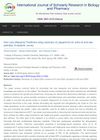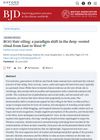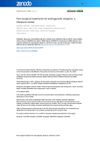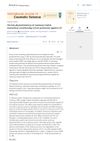 July 2024 in “Pharmaceutical Development and Technology”
July 2024 in “Pharmaceutical Development and Technology” Microsponges with rosemary oil significantly improve hair growth compared to regular rosemary oil and minoxidil.
 June 2024 in “International journal of scholarly research in biology and pharmacy”
June 2024 in “International journal of scholarly research in biology and pharmacy” Most students believe rosemary oil, peppermint oil, amla oil, and saw palmetto can help with hair loss.
 November 2015 in “Hair transplant forum international”
November 2015 in “Hair transplant forum international” Rosemary oil might help with male pattern baldness.
[object Object] Rosemary essential oil can be used in a stable massage cream, with the oil to water ratio affecting its properties.
1 citations,
February 2015 Rosemary is used for digestion, headaches, stress, memory improvement, hair growth, and aromatherapy.
Rosemary oil can boost hair growth by increasing certain enzyme activities and cytokine expression.
January 2008 in “한국미용학회지” Certain enzymes and a growth factor were higher in mice treated with minoxidil or a peppermint and rosemary oil mix, which may be good indicators of hair growth.
December 2007 in “한국미용학회지” Peppermint and rosemary oil mixture promotes hair growth similar to minoxidil and has antibacterial effects.
 June 2024 in “British Journal of Dermatology”
June 2024 in “British Journal of Dermatology” Hair oiling has become popular in the West due to globalization and social media.
 June 2023 in “Zenodo (CERN European Organization for Nuclear Research)”
June 2023 in “Zenodo (CERN European Organization for Nuclear Research)” Different non-surgical treatments like minoxidil, microneedling, and laser therapy can slow down and even reverse common hair loss, but each has its own limitations.
April 2023 in “International Journal of Dermatology” More research is needed to confirm if popular hair oils effectively treat hair loss.
April 2023 in “Seven Editora eBooks” Essential oils may help hair growth, but more research is needed.
 May 2024 in “Journal of cosmetic dermatology”
May 2024 in “Journal of cosmetic dermatology” A shampoo with caffeine and adenosine may help prevent hair loss and thicken hair.
 July 2024 in “Revista Científica de Estética e Cosmetologia”
July 2024 in “Revista Científica de Estética e Cosmetologia” The babassu fiber exfoliating product for hair loss should be stored in a cool place to stay effective.
Essential oils can help hair grow and are safer and more accessible than other treatments.
December 2012 in “한국피부미용향장학회지” Different aroma oils are suited for dry, oily, or sensitive scalps based on their specific chemical compositions.
 122 citations,
November 1998 in “Archives of Dermatology”
122 citations,
November 1998 in “Archives of Dermatology” Aromatherapy with certain essential oils is a safe and effective treatment for hair growth in alopecia areata patients.
[object Object] 
The hair masks are safe, stable, and effective for hair care.

Essential oils in a nanoemulsion help hair grow better than minoxidil 2% in mice.
22 citations,
September 2013 in “Science international” Leafy spices like basil and mint are very healthy and can help with digestion, hair loss, and inflammation.
 19 citations,
February 2015 in “Contact dermatitis”
19 citations,
February 2015 in “Contact dermatitis” Avoiding certain fragrances improved the man's skin condition.
 16 citations,
May 2017 in “American Journal of Clinical Dermatology”
16 citations,
May 2017 in “American Journal of Clinical Dermatology” The document concludes that more research is needed to understand and treat Beard Alopecia Areata due to limited current knowledge and evidence.
 12 citations,
November 2017 in “Archives of Dermatological Research”
12 citations,
November 2017 in “Archives of Dermatological Research” Mediterranean diet with fresh herbs and vegetables lowers male hair loss risk.
 5 citations,
May 2008 in “Pediatric Diabetes”
5 citations,
May 2008 in “Pediatric Diabetes” Low-glycemic index diets are beneficial for weight loss and satiety, but more research is needed on long-term effects and individualized approaches are recommended.

Accurate diagnosis and tailored treatments are crucial for managing hair loss in humans and animals.

No treatment alters the natural progression of alopecia areata, and effectiveness varies, with some possibly working better in children.
32 citations,
February 2020 in “PTR. Phytotherapy research/Phytotherapy research” Rosemary extract may boost the immune system, but more research on humans is needed to confirm this.
 September 2023 in “Apple Academic Press eBooks”
September 2023 in “Apple Academic Press eBooks” Rosemary has many health benefits and is used in medicine and cosmetics.
 August 2023 in “International Journal of Cosmetic Science”
August 2023 in “International Journal of Cosmetic Science” Rosemary extracts, specifically compounds like rosmarinic acid and carnosic acid, can protect hair from UV damage.
 December 2023 in “Research Square (Research Square)”
December 2023 in “Research Square (Research Square)” 12-Methoxy carnosic acid from rosemary might be a good natural treatment for hair loss.



















